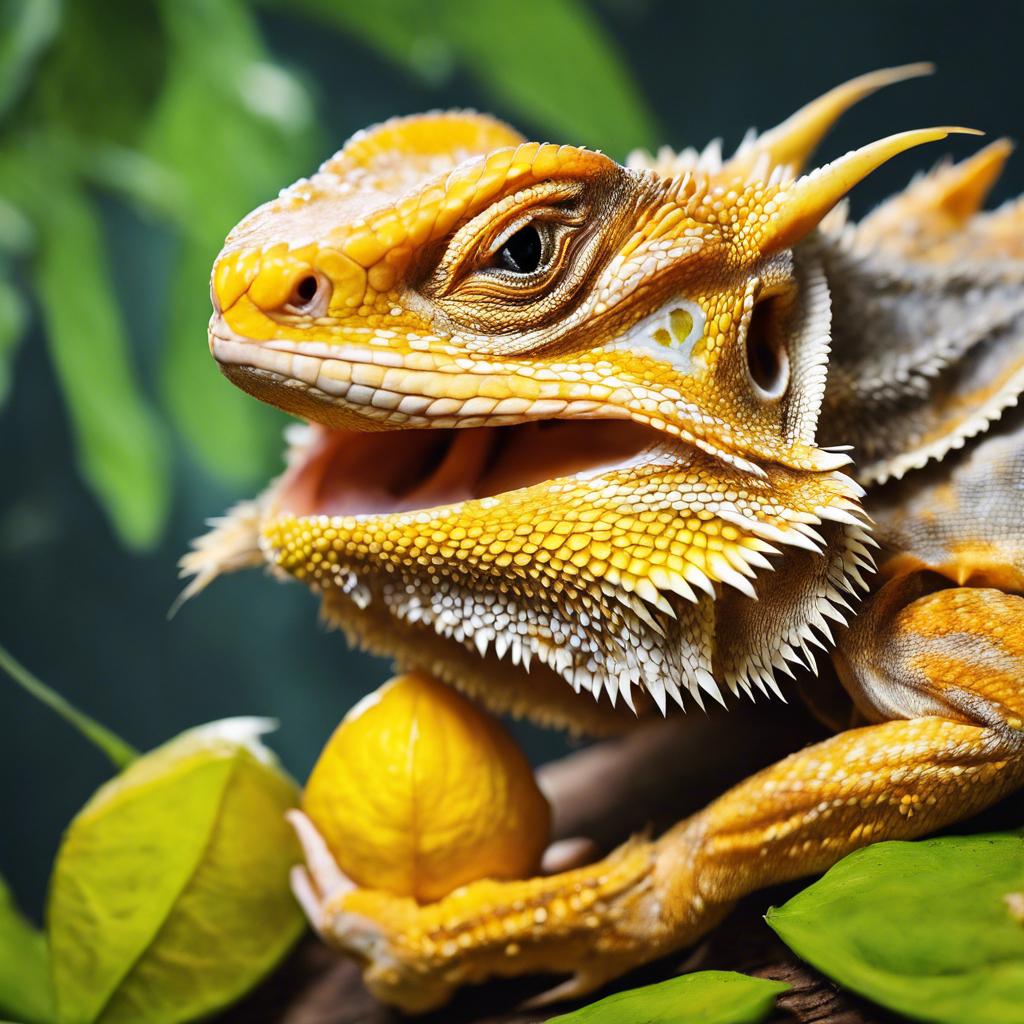Feeding a balanced and nutritious diet is crucial for the health and well-being of bearded dragons. While they primarily eat insects and leafy greens, incorporating fruits into their diet can provide additional nutrients and variety. One fruit that is often debated when it comes to feeding bearded dragons is star fruit. Star fruit, also known as carambola, is a tropical fruit that is rich in vitamins and minerals. However, it also contains high levels of oxalates, which can be harmful to reptiles if consumed in excess. In this article, we will explore the nutritional value of star fruit, the potential benefits and risks of feeding it to bearded dragons, and how to properly prepare and incorporate it into their diet.
Key Takeaways
- Star fruit is a nutritious fruit that can be fed to bearded dragons.
- Feeding star fruit to bearded dragons can provide benefits such as improved digestion and hydration.
- However, star fruit should be fed in moderation as it contains oxalic acid which can be harmful in large amounts.
- To prepare star fruit for bearded dragons, it should be washed and sliced into small pieces.
- Alternatives to star fruit for bearded dragons include other fruits and vegetables such as kale, collard greens, and blueberries.
Nutritional Value of Star Fruit
Star fruit is packed with essential vitamins and minerals that can benefit bearded dragons. It is a good source of vitamin C, which helps boost the immune system and promotes overall health. Additionally, star fruit contains potassium, which is important for maintaining proper muscle function and regulating blood pressure. Other nutrients found in star fruit include vitamin A, vitamin B6, dietary fiber, and antioxidants.
These nutrients can contribute to the overall health of bearded dragons. Vitamin C helps support their immune system, making them more resistant to diseases and infections. Potassium aids in muscle function, ensuring that their muscles are strong and healthy. Vitamin A promotes good vision and skin health, while dietary fiber aids in digestion.
Benefits of Feeding Star Fruit to Bearded Dragons
Feeding star fruit to bearded dragons can have several potential benefits. The high vitamin C content can help boost their immune system, making them less susceptible to illnesses. This is especially important for young or sick bearded dragons who may have weaker immune systems.
Star fruit also contains dietary fiber, which can aid in digestion. Bearded dragons are prone to digestive issues such as impaction, and incorporating fiber-rich foods like star fruit can help prevent these problems. Additionally, the antioxidants found in star fruit can help reduce inflammation and promote overall health.
To incorporate star fruit into a bearded dragon's diet, it can be sliced into small pieces and mixed with other fruits or vegetables. This can provide variety and encourage them to eat a wider range of foods. However, it is important to remember that star fruit should only be fed in moderation due to its high oxalate content.
Risks of Feeding Star Fruit to Bearded Dragons
While star fruit has its nutritional benefits, it also comes with potential risks for bearded dragons. One of the main concerns is its high oxalate content. Oxalates are naturally occurring compounds found in many fruits and vegetables, and they can bind to calcium in the body, potentially leading to kidney damage.
Bearded dragons are prone to calcium deficiency, so it is important to ensure that their diet is balanced and provides adequate calcium. Feeding star fruit in excess can increase the risk of calcium deficiency and potentially lead to kidney problems. It is crucial to feed star fruit in moderation and balance it with other calcium-rich foods.
Another risk of feeding star fruit is its potential for causing gastrointestinal upset. Some bearded dragons may have sensitive stomachs and may not tolerate star fruit well. It is important to monitor their digestion after introducing star fruit into their diet and discontinue feeding it if any adverse reactions occur.
Preparing Star Fruit for Bearded Dragons
Before feeding star fruit to bearded dragons, it is important to properly prepare it. Start by washing the star fruit thoroughly under running water to remove any dirt or pesticides. It is also important to remove any seeds or tough skin, as these can be difficult for bearded dragons to digest.
To prepare the star fruit for feeding, slice it into small pieces that are appropriate for the size of your bearded dragon. This will make it easier for them to eat and reduce the risk of choking. It is also a good idea to remove any excess juice or moisture from the fruit before feeding it to your bearded dragon, as too much liquid can cause diarrhea.
Feeding Star Fruit to Bearded Dragons

When introducing star fruit into a bearded dragon's diet, it is important to do so gradually. Start by offering a small piece of star fruit and observe how your bearded dragon reacts to it. If they eat it without any issues and show no signs of digestive upset, you can gradually increase the amount over time.
Star fruit can be incorporated into a bearded dragon's meals by mixing it with other fruits or vegetables. For example, you can create a salad by combining star fruit with leafy greens like kale or collard greens. This will provide a variety of nutrients and flavors for your bearded dragon to enjoy.
Frequency of Feeding Star Fruit to Bearded Dragons
When it comes to feeding star fruit to bearded dragons, moderation is key. Due to its high oxalate content, it is recommended to feed star fruit only once or twice a week. This will help prevent the risk of calcium deficiency and kidney damage.
It is important to balance star fruit with other foods in a bearded dragon's diet. This includes providing a variety of insects, leafy greens, and other fruits and vegetables. By offering a diverse range of foods, you can ensure that your bearded dragon receives all the necessary nutrients for optimal health.
Alternatives to Star Fruit for Bearded Dragons
If you are concerned about the risks associated with feeding star fruit to your bearded dragon, there are plenty of other fruits and vegetables that can be included in their diet. Leafy greens such as kale, collard greens, and dandelion greens are excellent sources of vitamins and minerals. Other fruits that can be fed in moderation include blueberries, raspberries, and mangoes.
When choosing fruits and vegetables for your bearded dragon, it is important to consider their nutritional value and potential risks. Avoid feeding foods that are high in oxalates or have a high sugar content. It is also important to wash all fruits and vegetables thoroughly before feeding them to your bearded dragon to remove any pesticides or dirt.
Bearded Dragon Care Tips
Feeding a balanced diet is just one aspect of caring for a bearded dragon. To ensure their overall health and well-being, there are several other factors to consider. First and foremost, it is important to provide a suitable enclosure with proper temperature and lighting. Bearded dragons require a basking spot with temperatures between 95-105°F (35-40°C) and UVB lighting to support their calcium metabolism.
Additionally, bearded dragons need access to fresh water at all times. It is important to regularly clean their water dish and provide clean, chlorine-free water. Bearded dragons also require regular exercise and mental stimulation, so providing them with a spacious enclosure with plenty of hiding spots and climbing opportunities is essential.
Feeding star fruit to bearded dragons can provide them with additional nutrients and variety in their diet. However, it is important to be aware of the potential risks associated with feeding star fruit, such as its high oxalate content and the potential for kidney damage. By feeding star fruit in moderation and balancing it with other calcium-rich foods, you can minimize these risks.
Before making any changes to your bearded dragon's diet, it is always best to consult with a veterinarian or reptile expert. They can provide guidance specific to your bearded dragon's needs and help ensure that they are receiving a balanced and nutritious diet. By providing proper care and nutrition, you can help your bearded dragon thrive and live a long and healthy life.
If you're wondering whether bearded dragons can eat star fruit, you may also be interested in learning about their dietary preferences and restrictions. Reptile Wizard has a helpful article on what bearded dragons can and cannot eat, including information on various fruits and vegetables. To find out more about the specific foods that are safe for your bearded dragon, check out their article on “Can Bearded Dragons Eat Star Fruit” here.
FAQs
What is a bearded dragon?
A bearded dragon is a type of lizard that is commonly kept as a pet. They are native to Australia and are known for their distinctive spiny “beard” under their chin.
What is star fruit?
Star fruit, also known as carambola, is a tropical fruit that is native to Southeast Asia. It is shaped like a star when sliced and has a sweet and tangy flavor.
Can bearded dragons eat star fruit?
Yes, bearded dragons can eat star fruit in moderation. However, it should not make up a large part of their diet and should only be given as an occasional treat.
What are the nutritional benefits of star fruit for bearded dragons?
Star fruit is a good source of vitamin C, fiber, and antioxidants. However, it is not a necessary part of a bearded dragon's diet and should only be given in small amounts.
Are there any risks associated with feeding star fruit to bearded dragons?
Yes, there are some risks associated with feeding star fruit to bearded dragons. Star fruit contains oxalic acid, which can bind to calcium and prevent its absorption. This can lead to metabolic bone disease in bearded dragons. Additionally, star fruit can be high in sugar, which can lead to obesity and other health problems if given in excess.

